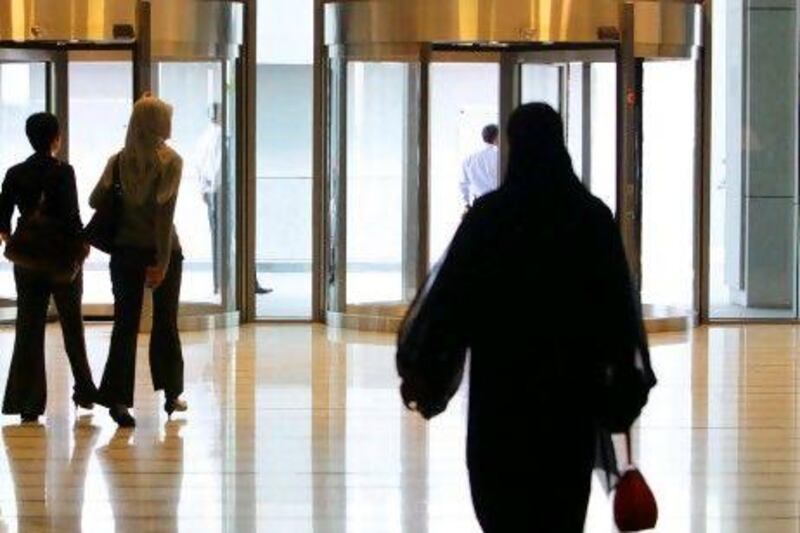Emirati women often prefer careers in the private sector but see government work as more realistic and socially acceptable, according to new research from the UAE University and the Emirates Foundation.
The study by professors at the university in Al Ain asked 335 Emirati women with an average age of 21 to rank what they considered the most "attractive" and the most "appropriate" jobs.
The women put educational careers at the top of both lists, but listed jobs in advertising, sales, consumer goods and beauty therapy as the next most "attractive".
Jobs near the top of the "appropriate" list included bastions of the public sector: civil service, the police force and health care.
"The public sector is considered much more appropriate and that's still a major issue," said Professor Ingo Forstenlechner, one of the academics who worked on the research project. "It's not an unknown issue, but it's a big one."
The research, funded with help from the Emirates Foundation and Occidental Petroleum, comes as the UAE steps up its long-standing Emiratisation drive, which aims to bring more UAE nationals into the private-sector workforce as the country's economy develops.
Surveys have repeatedly shown Emiratis would rather take government jobs because of the better pay, better benefits and shorter working hours they offer.
"Our findings add weight to the contention that the UAE's labour market distortions are in no small part due to the national cohort's desire to work in [the public] sector," the UAE University research paper said.
"Irrespective of profession or occupational role, the public sector is a more realistic sector to pursue a career in because of the compensation packages and work-life balance it affords to national employees."
The study, led by Emilie Rutledge, an assistant professor of economics, found that in addition to better pay and shorter hours, Emirati women considered government work preferable because it was more acceptable culturally.
"It's not that they don't want to work anywhere else [other than the public sector], it's that it's expected for them," Prof Forstenlechner said. "There are some occupations they report as being attractive which simply don't happen among Emirati women."
The study's authors also noted some of the sectors targeted by government Emiratisation bodies did not align with jobs women actually wanted.
"Of particular note to labour market policymakers in the UAE, it seems that the professions, industries thus far targeted for labour nationalisation quotas, particularly human resources and secretarial positions, are not in sync with the sorts of career choices Emirati women consider, be it in terms of [appropriateness] or attractiveness," the study said.
Manar Al Hinai, an Emirati fashion designer and writer in Abu Dhabi, pointed to better pay packages in the public sector as a critical force behind the preference for government work.
Women had been moving into the private sector in greater numbers before the Abu Dhabi Government raised salaries across the board a few years ago, she said.
"Before Abu Dhabi increased the salary packages just a few short years back, many of my female friends preferred to work in the private sector," she said.
"To them it was fun working in, for example, an advertising agency, or a TV network.
"However, now the salary packages have increased, many find it useless to work in an organisation that offers Dh6,000 [US$1,633] or less in comparison with the government sector that is secure, has shorter working hours and pays way higher."
The UAE University study also looked at the role of parental influence on Emirati women's career choices.
Those whose parents were well educated and in the workforce were more likely to follow suit. Those whose parents were less well educated were more likely to be discouraged from working.
"Parents also interfere when it comes to the job-selection process," Ms Al Hinai said. "They know how much the government jobs pay and if they are going to allow their daughter to enter the workforce, then it might as well be worth their time."
The push given by parents, however, was found to be a weaker factor than the pull of the public sector.
Fewer than 10 per cent of respondents to the survey said they planned to work within the private sector, while a full 28.4 per cent said they would not work at all unless they could get a government job.
Another 49.6 per cent said they would wait for a future government job rather than taking a private-sector job right away.
"We do observe, though, that the subsamples whose parents both have advanced levels of education or are both currently employed are on average more willing to consider private-sector career paths," the study's authors said.
"In addition, the sample members who had a parent working in the private sector were themselves significantly more likely to consider employment in this sector."





